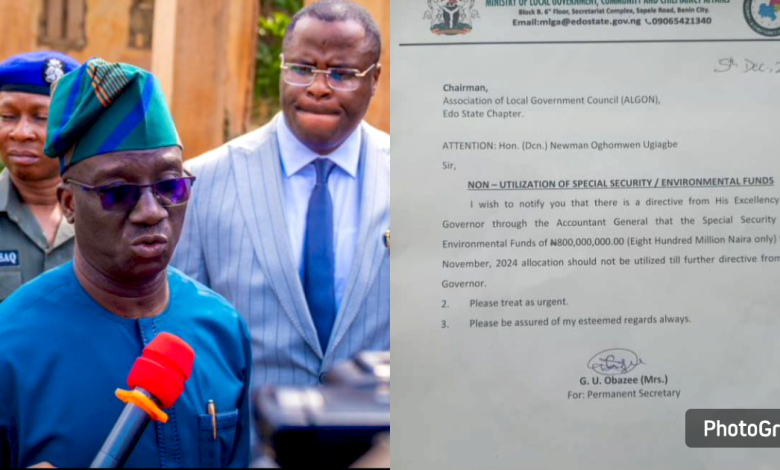
The suspension of all 18 local government chairmen and their vice-chairmen in Edo State has been tied to an alleged bid by the state governor to control an N800 million monthly Special Security and Environmental Fund.
A leaked letter dated December 5, 2024, from the Ministry of Local Government, Community, and Chieftaincy Affairs, instructed that the November allocation of the fund “should not be utilized until further directive from the Governor.”
Critics claim the directive is the reason for the escalating conflict between the governor and the local councils.
The timing of the suspensions has raised eyebrows, coming just days after the directive was issued.
Legal experts argue that freezing local government funds contravenes a recent Supreme Court judgment affirming the financial autonomy of local governments.
“This is a violation of constitutional rights and a clear overreach of authority. The Supreme Court ruling explicitly prohibits state interference in local government funds,” one legal analyst commented.
Tensions reportedly flared after the governor demanded detailed account statements from the council chairmen—a move deemed unprecedented and legally questionable.
When the chairmen resisted, sources suggest the governor resorted to suspension as retaliation.
Local governments rely on the N800 million monthly fund to support community policing, environmental projects, and other critical grassroots initiatives.
The freeze on the funds has disrupted local operations, sparking fears of heightened insecurity in the state.
Civil society leaders and legal observers have condemned the governor’s actions, calling them a threat to local democracy.
“Freezing council accounts and removing elected officials sets a dangerous precedent. This is not about governance; it’s about financial control,” a civil society leader warned.
Under Nigeria’s 1999 Constitution and the Supreme Court ruling, local councils are recognized as an independent tier of government, protected from arbitrary state interference.
Observers argue the current situation undermines this autonomy and reflects a broader power struggle over public funds.
